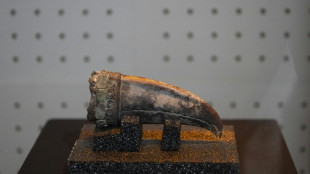-
 Indian army says new exchange of gunfire with Pakistan
Indian army says new exchange of gunfire with Pakistan
-
Epstein accuser Virginia Giuffre takes own life in Australia: family

-
 Hundreds of buildings damaged, dozens injured in 6.3 Ecuador quake
Hundreds of buildings damaged, dozens injured in 6.3 Ecuador quake
-
India and Pakistan's Kashmir fallout hits economy too

-
 Francis's funeral to be grand farewell to 'pope of the poor'
Francis's funeral to be grand farewell to 'pope of the poor'
-
Pogacar faces defiant Evenepoel at Liege-Bastogne-Liege

-
 Chelsea eye great escape against Barcelona in Women's Champions League
Chelsea eye great escape against Barcelona in Women's Champions League
-
Iran, US to hold new round of high-level nuclear talks

-
 'Energy and effort' pay off for Reds as Blues' woes continue
'Energy and effort' pay off for Reds as Blues' woes continue
-
Albatross and closing birdie lift China's Liu to LPGA Chevron lead

-
 On the horizon? Wave of momentum for high seas treaty
On the horizon? Wave of momentum for high seas treaty
-
Developing countries should fast-track US trade deals: World Bank president

-
 Grizzlies' Morant 'doubtful' for must-win game 4 v Thunder
Grizzlies' Morant 'doubtful' for must-win game 4 v Thunder
-
Trump in Rome for pope funeral in first foreign trip of new term

-
 Trump says Russia-Ukraine deal 'very close' after new Kremlin talks
Trump says Russia-Ukraine deal 'very close' after new Kremlin talks
-
US rookies lead PGA pairs event with McIlroy and Lowry in hunt

-
 Trump tariff promises get a reality check
Trump tariff promises get a reality check
-
Warriors coach Kerr 'relatively optimistic' injured Butler will play game 3

-
 Postecoglou hopes 'Stonecutter's Credo' can inspire Spurs
Postecoglou hopes 'Stonecutter's Credo' can inspire Spurs
-
PSG lose unbeaten Ligue 1 record ahead of Arsenal showdown

-
 Venezuela accuses El Salvador president of 'human trafficking'
Venezuela accuses El Salvador president of 'human trafficking'
-
Own goal takes Sundowns to African final against Pyramids

-
 Scores of buildings damaged, 20 injured in Ecuador quake
Scores of buildings damaged, 20 injured in Ecuador quake
-
US stocks extend rally as market eyes busy calendar next week

-
 Pope's death triggers surge of disinformation he fought against
Pope's death triggers surge of disinformation he fought against
-
Rovanpera takes control of Rally Islas Canarias

-
 Zelensky insists Crimea is Ukrainian as US envoy meets Putin
Zelensky insists Crimea is Ukrainian as US envoy meets Putin
-
Patel and Mendis help Sunrisers beat Kings in Dhoni's 400th T20

-
 Copa del Rey ref statements 'unacceptable': Real Madrid after boycotting final build-up
Copa del Rey ref statements 'unacceptable': Real Madrid after boycotting final build-up
-
Insurance CEO's accused killer pleads not guilty to federal murder charges

-
 FBI arrests Wisconsin judge for shielding undocumented migrant
FBI arrests Wisconsin judge for shielding undocumented migrant
-
Brazil ex-president Collor de Mello jailed for corruption

-
 Zelensky insists Crimea 'belongs' to Ukraine as US envoy meets Putin
Zelensky insists Crimea 'belongs' to Ukraine as US envoy meets Putin
-
Real Madrid boycott Copa del Rey build-up over referee complaints

-
 Trinidad and Tobago votes for parliament, PM, with opposition in lead
Trinidad and Tobago votes for parliament, PM, with opposition in lead
-
IMF chief hails 'constructive' Spring Meetings held under tariff uncertainty

-
 Iran FM Araghchi in Oman ahead of nuclear talks with US
Iran FM Araghchi in Oman ahead of nuclear talks with US
-
Dozens of buildings destroyed, 20 injured in Ecuador quake

-
 Young Barca must 'enjoy' Real Madrid Copa final fight: Flick
Young Barca must 'enjoy' Real Madrid Copa final fight: Flick
-
Pakistan and India border closure separates families

-
 Brazil's Bolsonaro 'stable' after post-surgery setback
Brazil's Bolsonaro 'stable' after post-surgery setback
-
Catholics in secular Cuba hail Francis as 'bridge'

-
 US envoy Witkoff, Putin discuss 'possibility' of direct Russia-Ukraine talks
US envoy Witkoff, Putin discuss 'possibility' of direct Russia-Ukraine talks
-
Community seeks answers after French school knife killing

-
 German prosecutors seek jail terms in VW 'dieselgate' trial
German prosecutors seek jail terms in VW 'dieselgate' trial
-
Sabalenka makes winning start at Madrid Open

-
 EU, US should de-escalate and negotiate trade deal: IMF Europe director
EU, US should de-escalate and negotiate trade deal: IMF Europe director
-
Russia accuses Ukraine of killing general in car bombing

-
 Emery wants FA Cup glory and Champions League berth for Villa
Emery wants FA Cup glory and Champions League berth for Villa
-
Buildings destroyed, one injured in Ecuador quake

Virtuoso keeps Afghan music alive despite Taliban ban
Homayoun Sakhi closes his eyes and runs his fingers along the long neck of his wooden instrument encrusted with mother-of-pearl.
"I feel like I have my Afghanistan in my hand," says Sakhi, one of the world's most renowned performers on the country's national instrument, the rubab.
He is jet-lagged after flying in from California to perform at London's Barbican concert hall to raise funds for emergency medicine and education in his homeland.
Along with the growing humanitarian crisis, Afghanistan's rich musical culture is under threat as the Taliban have banned music since their return to power last year.
Widely shared videos have shown them smashing and burning instruments. Musicians have fled the country.
"Right now we don't have music in Afghanistan," says Sakhi.
"It's really difficult because there's no concerts, there's no music, and (for musicians) it's very difficult to be without any money and without a job.
"That's why they're trying to go somewhere to play."
The Taliban clampdown is a repeat of the hardliners' previous time in power between 1996 and 2001, when they banned music as sinful, under a strict interpretation of Islamic law.
The rubab dates back thousands of years and has enjoyed a revival thanks to Sakhi, who is known as a musical innovator and has developed a more modern playing style.
BBC Music Magazine called him "one of the greatest performers" on the instrument.
Born in Kabul, he left Afghanistan with his family in 1992, in the chaotic aftermath of the Soviet withdrawal, moving to Pakistan.
He later settled in Fremont, California, which is known for its large Afghan community, and has launched an academy teaching the rubab.
"Each time I'm playing, I'm home, I feel like I'm in Afghanistan", he says.
- 'Cannot ban this' -
Music including pop was allowed a free rein during the past two decades in Afghanistan, with local television even showing a "Pop Idol" talent contest equivalent.
But following the Taliban's return to power, traditional Afghan music now relies on devotees overseas.
The "Songs of Hope" concert at the Barbican last Saturday was organised by Afghanistan International TV.
The London-based channel was set up by Volant media company, which also runs a Persian-language channel for Iranians.
It will screen a documentary about the concert in March.
In the first half, Sakhi plays classical Afghan pieces, followed by folk music that gets the audience clapping along.
He performs with UK-based virtuoso Shahbaz Hussain on tabla and Iranian musician Adib Rostami on the kamancheh, a bowed string instrument.
"I had the idea to do the concert -- that was the only thing I can do as a musician", said Rostami, one of the event's organisers.
"As we know, now the music is banned in Afghanistan -- they cannot ban this from the people around the world."
"We have to try as musicians, as music lovers, to find a way to keep this cultural heritage for the future".
The current situation for musicians under the Taliban is "back in the 1990s", he says.
"Again, you cannot be a musician in Afghanistan.
"As far as I know, most of the musicians... are trying to get out of the country."
A group of students and teachers from a national music school in Kabul arrived as refugees in Portugal in December, after the Taliban's takeover earlier last year.
Afghanistan's first all-female orchestra, Zohra, set up in 2016 and named after a Persian goddess of music, has moved to Qatar.
A.Malone--AMWN



